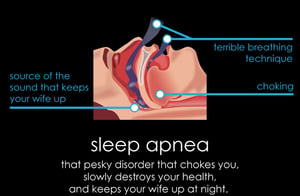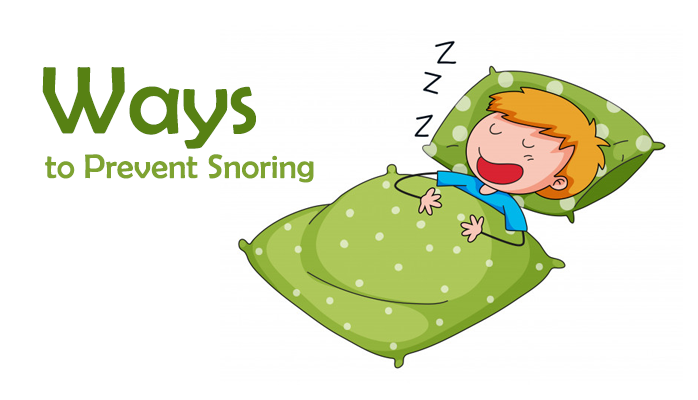Snoring has many causes, including:
- Obstructive sleep apnea (OSA)
- Deviated septum
- Allergies (congestion)
- Improper head elevation
- Alcohol or other sedative drugs/medications
- Smoking
- Obesity
- Tumors/cysts
- Genetics (snoring is hereditary)
 Of the causes on this list, obstructive sleep apnea is the most common and most dangerous if untreated. Long-term consequences include:
Of the causes on this list, obstructive sleep apnea is the most common and most dangerous if untreated. Long-term consequences include:
- Lower life expectancy
- Lower quality of life in nearly all areas
- Lower performance in nearly all areas of life
- Increased risk of many heart-related diseases
Continue reading to learn more about effective ways to prevent snoring.
What Causes Snoring Sounds
Snoring is defined by the National Sleep Foundation as “noisy breathing during sleep.” The most common risk factors are being male and overweight, however, all genders and body sizes can experience snoring. Snoring is a result of an obstruction of free flowing air through the back of the mouth and nose, blocked air caused by relaxed muscles at the back of the throat, and vibration of the soft palate and uvula.
Snoring becomes more common with age because relaxation of the throat muscles increases. Also, individuals with large tonsils, adenoids, nasal polyps, or deviated septums may be more prone to blockage and snoring.
See: Why Do I Snore for more information.
How to Prevent or Decrease Snoring
The easiest way to stop snoring is to identify and address the cause. A simple approach is a process of elimination to see what lifestyle changes have the largest impact on your snoring. Some examples include:
- Losing weight
- Cutting back on smoking
- Cutting back on drinking – no more night cap!
- Sleep in a different position, such as not on your back
- Buy an anti-snoring pillow
If you attempt these lifestyle changes and the snoring persists, or worsens, then there may be a more serious underlying cause that requires further investigation. You may begin by getting a sleep study and assessing other potential causes, such as:
- Sleep deprivation
- Medications
- Family history
- Allergy sensitivities
- Anatomy of the face and nose
Facts About Snoring
Here are common facts about snoring that may help you understand snoring better:
- Snoring, by itself, is not inherently dangerous
- Snoring can be a sign of a serious, underlying condition, such as OSA
- Chronic snoring increases risk for developing high blood pressure, stroke, and heart attack compared to those who do not snore
- Snoring is hereditary
- Alcohol or other sedatives can exacerbate snoring
- 3 out of every 10 women snore
- 4 out of every 10 men snore
- The decibel range of snoring is similar to a pneumatic drill (50dB - 100dB)
- People become more susceptible to snoring as they age
- Elevating your head while sleeping can significantly help snoring
- About 90 million American adults snore from time to time
- 37 million Americans snore on a regular basis
In short, if you snore, you’re not alone.
Do You Have Socially Unacceptable Snoring?
Some snoring is so disruptive that it is known as socially unacceptable snoring (SUS) and is characterized by snoring that is so bad, it:
- Keeps your bed partner awake at night
- Keeps your roommate awake at night
- Awakens you from time to time
- Requires ear plugs for anyone sleeping closely
- Is the center of many family jokes
- Is embarrassing
While snoring occasionally is common, frequent snoring or snoring every night is called chronic snoring. Chronic, socially unacceptable snoring isn’t harmful in itself, but it can be an indicator of an underlying and potentially serious medical condition: obstructive sleep apnea (OSA). Therefore, if you or someone you know struggles with snoring, then it may be worth investigating further.
If you live in Alaska and can’t seem to stop your snoring, and are concerned that it might be caused by an underlying sleep disorder, please click the orange button below to take a free online sleep test and talk with one of our sleep health professionals.


